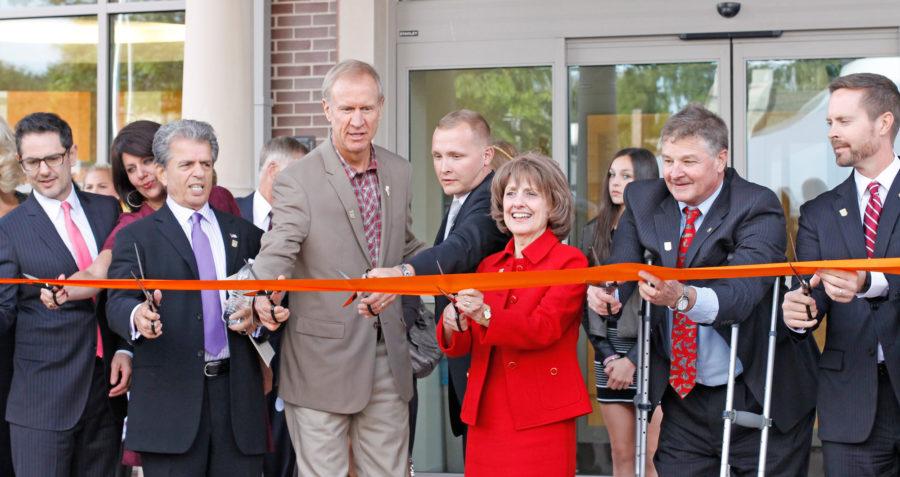University outreach program addresses student veteran challenges
Illinois Governor Bruce Rauner attends the Dedication Ceremony and ribbon cutting for the Center for Wounded Veterans in Higher Education in Urbana on October 2.
Mar 29, 2018
Last updated on April 2, 2018 at 10:44 a.m.
The University has launched a new outreach program to address the unique challenges student veterans face.
Jason Sakowski, veteran services coordinator, and Nick Osborne, director of the Center for Wounded Veterans, reached out to all the community colleges in the state to recruit veteran transfer students.
“99 percent of our (veteran) students are actually transfer students from other community colleges,” Sakowski said. “A lot of our students are getting out and starting at community college and then learning what they want to do.”
Osborne said that in many ways, the University is designed for students coming straight out of high school, and veterans face unique challenges on campus.
Get The Daily Illini in your inbox!
Tariq Khan, a military veteran and graduate student, said he doesn’t believe the support services for veterans go far enough in an email.
“I can’t speak for all veterans, but I can say that I cannot afford healthcare,” Khan said. “In the United States we glorify veterans with our rhetoric, but we leave veterans jobless, out in the cold to starve. This is a nation that uses poor and working class people as cannon fodder.”
According to Sakowski, the University provides support services for the 350 active duty or veteran students on campus through the Center for Wounded Veterans and Veteran Support Services.
“The Center for Wounded Veterans provides a very comprehensive blend of services that are specific to each student’s need,” Osborne said.
The center was started in 2015 to provide a model similar to Disability Resource Educational Services, but specifically tailored for veterans.
The Center houses 14 student veterans, and works closely with DRES and the US Department of Veteran Affairs to ensure students have access to therapists and counselors, Osborne said.
Sakowski said Veteran Support Services will also launch a professional mentorship program to help ensure veterans can find employment after graduation.
“One of the biggest obstacles we go up against is a lot of student veterans don’t like to see themselves as having a disability because they don’t like the term ‘disabled.’ In the military, you are expected to tough through and muscle through any issue that comes up,” Osborne said.
Osborne said it’s important to provide a safe environment and to change the language around disability to address the stigma.
Sakowski said harmful stereotypes are another challenge veterans face.
“People don’t want veterans to be real, rounded people,” Khan said. “They want us to be patriotic symbols. They want to be able to say “thank you for your service,” and then pat themselves on the back for being such good people,” Khan added.
Sakowski said Veteran Support Services runs veteran ally trainings to educate people on the challenges faced by veteran students.
“When you see a movie about military or veterans, what is it most likely about? It’s always Navy Seals… it’s not your person who’s in the Navy who calibrates machinery. Because that’s not sexy and that doesn’t sell stories,” Sakowski said.
At the federal level, veterans are given 36 months of paid tuition, a book stipend and a $1,000 cost of living allowance. Veterans in Illinois are also given 120 credit hours of paid tuition for graduate school under the Illinois Veterans Grant, Sakowski said.
“It is and it isn’t a great deal depending on what military service was like,” he said.
Osborne said Illinois has a veteran retention rate of 92 percent.
“What we need to do as an institution is determine what veteran-friendly means to us,” Osborne said. “I’d like to see us more connecting with a larger populace and working closely with community colleges across the state.”






